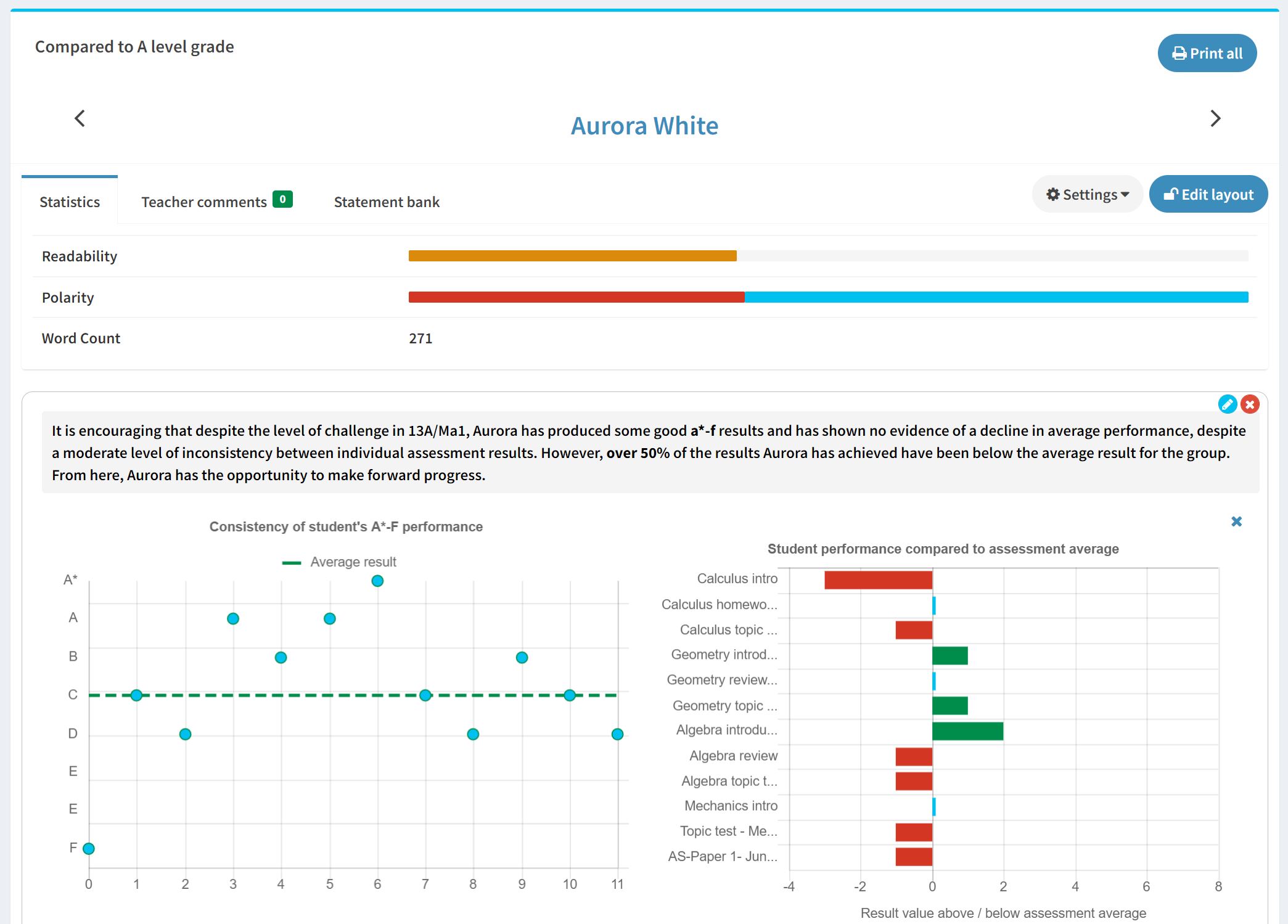The
 blog
blog
The ECT guide to report writing
25th November 2021 | Sarah CullThe first set of reports I ever wrote as a trainee teacher on my PGCE filled me with paralysing dread. The (helpful and supportive) teacher I was working with allowed me to write 3 reports for the A-Level Physics set I had been co-teaching. She gave me guidance and some examples of her previous reports, said we’d go over them together and sent me off to have a go.
Teaching Science, I have seen hundreds of non-essay inclined students struggling to put pen to paper for a six mark question, faces screwed up in the effort to lower the ink the last 2cm to the page. I became one of them. I spent hours staring at the blank screen, agonisingly writing a name or ‘In Physics….’ then stalling and going off to make a cup of tea, convinced it would give me the magic ability to write.
Although it seems crazy now how long those first 3 took me to write, looking back on the thousands I have written since, the fear has never completely left me and I have never found it easy. That said, there are things that helped me that might be useful for other trainees or report writing novices.

How many reports do I have to write?
This largely depends on your school.
The government requirements are that a written report has to be provided once a year and the NASUWT advice reinforces that expectation, adding that schools can produce interim reports so long as they are just generated from data.
Some schools choose to have reports around the Christmas holidays, either for certain year groups in secondary, shorter reports in primary or tutor comments on termly grades.
Your school’s reporting calendar will help you understand how many you will have to write and when. Depending on the balance of students you teach, you may have a greater load at certain times of the year. Start by talking to your mentor if you’re a trainee or ECT and establish the expectations of the school.
Where do I start?
Here are 10 starting points for writing reports as a trainee:
-
Establish vital information, be organised. One important skill whilst training is organisation. The more time you can give yourself to plan and prepare and ask for help as a trainee or an ECT, the better!
Before you even think about writing anything, make sure you know the following:
- Deadlines for reports List of students/subjects you are writing for
- The School report writing policy (wordcount, accompanying grades and data, rules on double spacing, name rules etc)
- Who can you go to for advice and to check your reports for you?
- Where do your reports go when you have written them? Do they get checked again by a line manager? Do you need to upload them somewhere?
- What is the policy on any changes that need to be made? Do they get returned automatically somewhere you need to check? Will someone come and find you and talk it through?
-
Get to know your students if you don’t already With the best will in the world, there might be some students that you just don’t know. Particularly starting out when you have so many things to worry about, you might not be at the stage of knowing every student as an individual. Forgive yourself for this. Some subjects have infrequent lessons with heavy student numbers, some students have frequent absences. Teaching in primary although you may know each student, saying something productive and unique for every single subject could be challenging.
It’s not about making excuses or lowering expectations, It’s about figuring out what is getting in our way and trying to make change for the better. Be organised, start thinking about your reports ahead of the deadline, then make an effort with the students you know less. Find something in their work, speak to them in lessons, find them when you have a duty, work to close the gaps. The aim is to be able to look at your student list and be able to say something individual about each one.
-
Have a look at data Data is important, particularly for exam classes but for other groups as well. If you are making comments about progress from the start of the year or compared to target metrics or predicted grades, make sure you have the data to back it up. If a grade is accompanying the report, make sure your comment reflects the narrative. The overall feel of the report should be consistent with the feeling the student or parent will experience from the grade, otherwise this creates a sense that something is wrong.
Vizi is a really useful tool for taking all of your markbook data and producing data-based reporting statements straight from the information provided so you don’t have to spend hours trawling your markbook. Trends like progress, metric comparison and comparison to the group average are calculated and summarised to produce an evidenced basis for the rest of your report.
-
Structure the key information you want to convey Schools have different motives for sending out reports and parents will have different reactions and expectations. Let’s assume for a minute that we are writing a report to help the student and improve their educational experience; what do you want to convey to achieve this?
Learning Ladders have a great 4 part approach to reports that may help to structure important things to say:
Learning ladders report writing advice
“Each statement in a school report should include 4 elements: the achievement/success; evidence of that success; the target; resources to help meet the target.”
Providing advice on next steps is important if you intend your report to make a positive difference.
-
Honesty...but with no big surprises It is important not to lie in a report (don’t say a student is making excellent progress if they are not) but equally it’s not your opportunity to settle every score you might have with a challenging student. From you writing your report to it going home will probably be weeks, maybe being handed over on the last day of term with no time for a right to reply. If there is an issue, arrange a meeting NOW and discuss next steps, then you can refer to the ongoing conversation as a positive development.
Talk to colleagues Talk to others who teach your students, see them in the playground, do clubs with them, socialise with their parents. Read other reports for inspiration on sentences and phrasing. I’m sure there’s a phrase for this...oh yes, sharing best practice! (Or practise…)
-
When you start writing, and this is a big one, do it in a program that you can save your work in confidently. Do NOT type straight into the MIS…. you only make that mistake once. Spellcheck and a word counter are also your friends.
-
Judge digital approaches not, lest ye be judged Some schools promote comment banks, some detest them. Being angry at someone else’s approach doesn’t save ourselves any time or make what we do any better.
If you use comment banks, use them thoughtfully. If you write everything personally with no copy paste, have pride in your writing skills and maybe consider offering writing guidance to others if you feel passionately about not using comment banks.
I’ve certainly spent hours with an online thesaurus trying to expand my vocabulary to accurately describe the difference between the child who is earnest and the one who is genuinely enthusiastic.
Vizi reports try to offer a balance, with automated data-based statements that can be automatically reworded and the ability to add your own, personalised statements about the student.
-
Check your work! You learn this lesson the day you become a form tutor who has to proofread 350 reports over the weekend then write a summary comment. Noone expects Booker Prize level editing but look for:
- The name. Are they Timmy, Tim or Timothy? Even worse, are they actually Jessica? If your school has a rule, check it and stick to it.
- Pronouns. Even without copy paste, she and he are only a letter apart but it looks bad and won’t get picked up by spellcheck.
- Go back through any editing guidelines you have been given and check you have stuck by them. Year Vs year, six Vs 6….capital letters, double spacing, formal names. The debate on whether consistency or individuality is better will still be waging in 5 years so for now, go with the flow.
- Have you started a sentence and failed to finish it, used apostrophes aggressively or incorrectly used there and their?
-
Get someone to have a look over your work Outside eyes are always helpful, particularly for reports early on. Either a colleague or a friend outside the profession to just have a quick grammar scout and check if it seems coherent, sensitive and constructive.


Ultimately, reports are treasured by some students and parents and chucked in the bin by others so not every lovingly crafted piece of prose you produce will be appreciated. But hey, that’s the job!
Take a deep breath, make a cup of tea and happy report writing!
Other articles you may be interested in
4th November 2021 10 mins
Blog post
12th October 2021 10 mins
Blog post
Exams 2022 - have your say
Read more23rd October 2019 10 mins
How to
Track SEN cohorts
Read more7th June 2019 10 mins
Blog post
Encouraging marking standardisation
Read more4th April 2019 10 mins
Blog post
Machine learning in education
Read more4th December 2018 10 mins
How to
Creating a seating plan
Read more4th October 2018 10 mins
How to
Auto grade your assessments
Read more2nd August 2018 10 mins
How to
Using assessment breakdowns
Read more1st November 2017 5 mins
Blog post
6 steps to follow to create a good data environment for your school
Read more20th July 2017 10 mins
Blog post